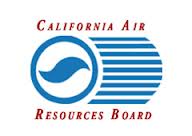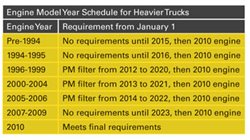
Whether you conduct business in the state of California or not, there is a good chance you have heard the buzz around town regarding the CARB (California Air Resources Board) regulations going on within this state for any trucking activity within its borders. Whether you are conducting intrastate business or coming/going with an interstate load, you will be expected to comply all the same with this new set of rules being implemented in annual phases.
Although meant for the bettering of the state’s air quality, which I know first-hand is not all that nice to breathe at times, its “ugly side” is getting most of the attention. With the first two rounds of “truck eliminations” already having taken place and another scheduled for the beginning of 2014, the pinch is starting to hit some in their pocket books!
Being that I run a great deal of my freight in my home state of California, I hear and see a lot of the effects happening as we go along on this trend of eliminating trucks. Being that I just sold my 2006 truck equipped with a 2005 motor, I was able to recently witness the effect it is having on the used truck market. When I found out I was receiving a new Freightliner Cascadia Evolution to drive as part of being a Team Run Smart Pro, I had options to consider regarding the truck I already owned.
Upon weighing out some of the costs for my particular business, I decided the cost of retrofitting it with a PM (Particulate Matter) filter along with the downtime (typically three to four weeks) for installing the device would not be as lucrative an option as selling it outright to make a profit.
Like a lot of owner-operators looking to sell a truck, I started with some of the major nationwide online and print publications. Although expensive and containing a high amount of large used truck dealer ads, this is what I figured would be the best way to get exposure at the time. After only a couple low-offer calls and long periods without any calls at all, I began to wonder what could be the problem. My truck was very well taken care of, extremely clean, polished out, and had an almost new APU to boot! Why wouldn’t a truck like this be jumped on when set at a far below-retail value? The answer leads to the “impending doom” known as CARB Truck and Bus Regulation Phase Three.
 As shown in the chart of phases, the first phase implemented in January 2012, eliminated non-PM filter equipped trucks with engine model years between 1996 and 1999. If you happen to have installed a PM filter on your equipment with engine dates in this bracket, your truck can still run in California until the end of 2020. Phase two, which was implemented in January 2013, is similar in that it eliminates non-PM filter trucks with engine model years between 2000 and 2004. PM filter-equipped engines located in this bracket can continue operations until the end of 2021. Phase three, which was a deciding factor in my consideration to sell my old truck, is set to take place in January 2014. This phase is set to eliminate the rest of the non-2007 EPA series or older motors out there with the elimination of trucks not PM filter-equipped with engine model years between 2005 and 2006. PM filter equipping these trucks will give you the ability to operate in California until the end of 2022. If you happen to have an engine that was made between 2007 and 2009, you’re in the clear until the end of 2023. Once all of these trucks meet their fate, the only trucks allowed in California will be engine model year 2010 or newer. Also, an important thing to remember when figuring your exact engine manufacture date, it usually trails the truck model year by one (e.g. - my 2006 truck had a 2005 motor). Check the side of your engine block for this the manufacture date stamp.
As shown in the chart of phases, the first phase implemented in January 2012, eliminated non-PM filter equipped trucks with engine model years between 1996 and 1999. If you happen to have installed a PM filter on your equipment with engine dates in this bracket, your truck can still run in California until the end of 2020. Phase two, which was implemented in January 2013, is similar in that it eliminates non-PM filter trucks with engine model years between 2000 and 2004. PM filter-equipped engines located in this bracket can continue operations until the end of 2021. Phase three, which was a deciding factor in my consideration to sell my old truck, is set to take place in January 2014. This phase is set to eliminate the rest of the non-2007 EPA series or older motors out there with the elimination of trucks not PM filter-equipped with engine model years between 2005 and 2006. PM filter equipping these trucks will give you the ability to operate in California until the end of 2022. If you happen to have an engine that was made between 2007 and 2009, you’re in the clear until the end of 2023. Once all of these trucks meet their fate, the only trucks allowed in California will be engine model year 2010 or newer. Also, an important thing to remember when figuring your exact engine manufacture date, it usually trails the truck model year by one (e.g. - my 2006 truck had a 2005 motor). Check the side of your engine block for this the manufacture date stamp.
This may seem like a lot of information to soak in all at once. There is a lot more to be had, that I will spare you for now, when it comes to special exclusions for larger fleets, lighter-duty trucks, and special-duty vehicles. Due to the increasing pressure of these phases, the California used commercial truck market has become swamped with used trucks being affected by these rules. This surplus in eliminated and soon-to-be eliminated trucks has made selling these trucks within the state very hard, especially for a decent price. Supply is up and demand is down, resulting in a bad market situation. Of all of the offers I received, all but one came from outside of California. In the end, I settled for an offer from a Texas buyer that was far below what I initially wanted to take when I first considered selling. I realized that given the state of the current used-truck market, it would only become harder to sell my truck as the “end game” for my truck grew closer. We all know it is most likely just a matter of time before more of the states start to adopt these laws and policies, as most tend to follow California’s lead! When contemplating adding a piece of equipment for your business, remember to consider the age and effective use period and if it will benefit you more in the long run over the effect it will have on the bottom-line.
With all of the freight that originates and ends here, many throughout the country will feel, or have already felt, the impact of these new laws. If you happen to run in California, how do you plan to deal with the CARB laws if you haven’t already? If you have, what steps did you taken to assure your business thrives through these implementation phases? Are you one of the owner-operators or small fleet owners planning to stop running freight in this state as a result, like some I have talked to? Please post your comments below. I am very interested in hearing how these rules have affected my fellow businessmen and businesswomen out there.